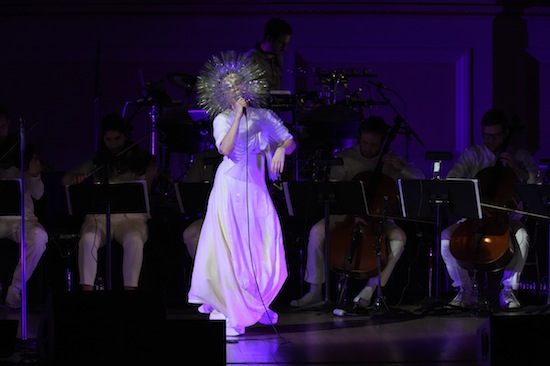There is something absolutely crushing about seeing Björk perform Vulnicura when you’re a tad heartbroken yourself – the kind of staggering emotional suckerpunch that leaves you bleary and red-eyed during intermission and the kind that stings a little worse when you realize the seat next to you is empty.
After all, it’s hard enough to simply hear the entirety of Vulnicura on a pair of headphones and not feel like you’ve just been gutted clean, so when you amplify that by adding top-notch sound technology, a 15-piece string section and the expanse of the historic Carnegie Hall, it becomes a spiny study in a broken heart that somehow, miraculously manages to elude cliché. A true feat, especially as so many have been eager to merely brush Vulnicura off as "Björk’s Break-Up Album," rather than acknowledge it as a complex, carefully study of a brilliant producer’s darkest place. And thankfully, it will soon become an unignorable fact once you see Björk’s mesmerising, emotionally draining show that’s simultaneously perplexing and terrifying in its honesty.
An act of acute transparency, Vulnicura is simply a projection of an incredibly intimate grief and a brave embrace of what is often brushed aside as cheesy "feminine emotional vulnerability." Leave it up to Björk though to come up with an incalculably honest way of wearing her heart on a (perfectly-draped) sleeve for a room of 2800 faces. 2800 stony New Yorkers who also ended up sniffling, cheering and soaring along to every last sweeping, swan-like croon and convoluted declaration of processional healing – the most poignant example being the way she defiantly yelled ‘Mouth Mantra”s "I am not hurt" line to a deafening roar of applause.
It’s no surprise though, as it was a performance that was instantly relatable to anyone who’s ever lost or felt left behind. A venerable idea to take to Carnegie Hall, a revered institution whose programming tends to feel a little dry and elitist, and the kind of place that only hosts musicians who’ve "proven" their lasting impact. After all there were constant reminders that this was not merely "another Björk show," as the projection of her lyrics made sure her purposeful exposure of emotion was the star of the show; a reaffirmation that even avant-popstars are privy to being emotional black holes at times. It’s a point she also hammered home by choosing to perform the first half of her show in an attention-arresting, sea urchin-esque headpiece, which rendered her facial expressions almost impossible to read; the sort of precaution one does require when choosing to be strong enough to bring one’s most vulnerable, intimate moments to international attention.
So obviously it’s fitting that gone was the lighthearted eclecticism of Volta or the self-indulgence of Post, replaced instead by the kind of deep-set emotional resonance that anyone who has loved and lost can easily recall – the turbulent end, the listless haze that sets in, the sluggish process of putting yourself back together, despite possibly missing a few pieces. An idea I fancied was reflected in the Natural History Museum-esque visuals of mingling slugs and millipedes, that danced to sprinklings of material that spanned from Debut (‘Come To Me’) to Medulla (‘The Pleasure Is All Mine’). Another way for Björk to put things into perspective and attempt to rejoin the world, and a way of reminding us that we are small but important components of this all and that there will always continue to be more beyond the confines of your tissue-strewn bedroom.
It’s a point made poignant by her final song, a hope-encrusted, partially healed rendition of her classic ‘Wanderlust’ – the optimistic notion of the universe working itself out heavy in the air, as she slowly sang, "I feel at home whenever the unknown surrounds me. I receive its embrace aboard my floating house."


